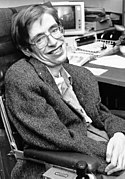Stephen Hawking Quote
The big question in cosmology in the early 1960s was did the universe have a beginning? Many scientists were instinctively opposed to the idea, because they felt that a point of creation would be a place where science broke down. One would have to appeal to religion and the hand of God to determine how the universe would start off. This was clearly a fundamental question, and it was just what I needed to complete my PhD thesis.Roger Penrose had shown that once a dying star had contracted to a certain radius, there would inevitably be a singularity, that is a point where space and time came to an end. Surely, I thought, we already knew that nothing could prevent a massive cold star from collapsing under its own gravity until it reached a singularity of infinite density. I realised that similar arguments could be applied to the expansion of the universe. In this case, I could prove there were singularities where space–time had a beginning.A eureka moment came in 1970, a few days after the birth of my daughter, Lucy. While getting into bed one evening, which my disability made a slow process, I realised that I could apply to black holes the casual structure theory I had developed for singularity theorems. If general relativity is correct and the energy density is positive, the surface area of the event horizon—the boundary of a black hole—has the property that it always increases when additional matter or radiation falls into it. Moreover, if two black holes collide and merge to form a single black hole, the area of the event horizon around the resulting black hole is greater than the sum of the areas of the event horizons around the original black holes.
The big question in cosmology in the early 1960s was did the universe have a beginning? Many scientists were instinctively opposed to the idea, because they felt that a point of creation would be a place where science broke down. One would have to appeal to religion and the hand of God to determine how the universe would start off. This was clearly a fundamental question, and it was just what I needed to complete my PhD thesis.Roger Penrose had shown that once a dying star had contracted to a certain radius, there would inevitably be a singularity, that is a point where space and time came to an end. Surely, I thought, we already knew that nothing could prevent a massive cold star from collapsing under its own gravity until it reached a singularity of infinite density. I realised that similar arguments could be applied to the expansion of the universe. In this case, I could prove there were singularities where space–time had a beginning.A eureka moment came in 1970, a few days after the birth of my daughter, Lucy. While getting into bed one evening, which my disability made a slow process, I realised that I could apply to black holes the casual structure theory I had developed for singularity theorems. If general relativity is correct and the energy density is positive, the surface area of the event horizon—the boundary of a black hole—has the property that it always increases when additional matter or radiation falls into it. Moreover, if two black holes collide and merge to form a single black hole, the area of the event horizon around the resulting black hole is greater than the sum of the areas of the event horizons around the original black holes.
Related Quotes
I have tried to read philosophers of all ages and have found many illuminating ideas but no steady progress toward deeper knowledge and understanding. Science, however, gives me the feeling of steady...
Leonardo believed his research had thepotential to convert millions to a more spiritual life. Last year he categorically proved the existence ofan energy force that unites us all. He actually demonstr...
About Stephen Hawking
Hawking was born in Oxford into a family of physicians. In October 1959, at the age of 17, he began his university education at University College, Oxford, where he received a first-class BA degree in physics. In October 1962, he began his graduate work at Trinity Hall, Cambridge, where, in March 1966, he obtained his PhD degree in applied mathematics and theoretical physics, specialising in general relativity and cosmology. In 1963, at age 21, Hawking was diagnosed with an early-onset slow-progressing form of motor neurone disease that gradually, over decades, paralysed him. After the loss of his speech, he communicated through a speech-generating device initially through use of a handheld switch, and eventually by using a single cheek muscle.
Hawking's scientific works included a collaboration with Roger Penrose on gravitational singularity theorems in the framework of general relativity, and the theoretical prediction that black holes emit radiation, often called Hawking radiation. Initially, Hawking radiation was controversial. By the late 1970s, and following the publication of further research, the discovery was widely accepted as a major breakthrough in theoretical physics. Hawking was the first to set out a theory of cosmology explained by a union of the general theory of relativity and quantum mechanics. He was a vigorous supporter of the many-worlds interpretation of quantum mechanics.
Hawking achieved commercial success with several works of popular science in which he discussed his theories and cosmology in general. His book A Brief History of Time appeared on the Sunday Times bestseller list for a record-breaking 237 weeks. Hawking was a Fellow of the Royal Society, a lifetime member of the Pontifical Academy of Sciences, and a recipient of the Presidential Medal of Freedom, the highest civilian award in the United States. In 2002, Hawking was ranked number 25 in the BBC's poll of the 100 Greatest Britons. He died in 2018 at the age of 76, having lived more than 50 years following his diagnosis of motor neurone disease.
